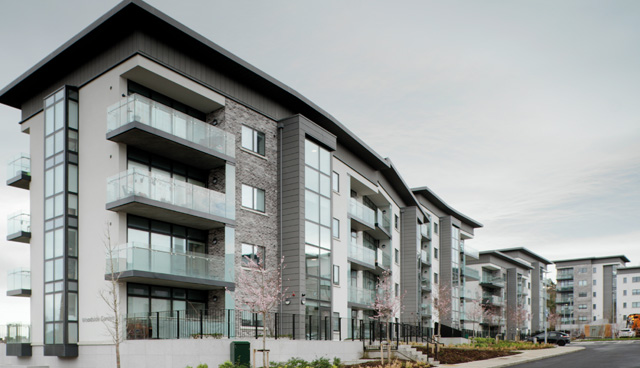
Cover: Defined by delivery
18th July 2023
Foreword: Delivering sustainable housing
18th July 2023Housing Minister Darragh O’Brien TD: ‘No silver bullet on housing’

Midway through the second full year of implementation of the Government’s Housing for All plan, Minister for Housing, Local Government and Heritage Darragh O’Brien TD sits down in his Leinster House office to reflect on the ubiquitous challenge of housing delivery with Ciarán Galway.
“We had a good year [in 2022],” O’Brien asserts reflecting on the number of homes delivered across several tenures, though he acknowledges: “Progress is being made but people are not feeling that yet.” As such, increasing supply, particularly in social and affordable housing, remains his greatest priority as minister, next only to eradicating homelessness.
Despite considerable headwinds in the external environment, including construction cost inflation, the overall supply of homes is increasing. In May 2022, the Office of Government Procurement published guidance for parties to public works contracts to establish an Inflation Cooperation Framework, announced by then-Minister for Public Expenditure and Reform, Michael McGrath TD. Application of the framework includes a 70:30 burden sharing whereby the State bears up to 70 per cent of the additional inflationary related costs.
“The work that Michael McGrath did with us [in 2022] in particular around the inflation framework, particularly in the public sector, was really important. That basically made sure that no scheme stopped. There was some stalling of schemes, but in fairness to the Minister, he acted very quickly.
“There is still a risk with the increase in funding rates; no question. That is the environment that we are living in in Europe and in the developed world too. We have to be nimble to respond to the outside environment which is there to make sure that our delivery is not decreasing because in other countries it is.
“All you have to do is look at other European countries; they have not had that type of response that we have been able to bring forward. We are effectively plugging that gap by the State investing further in making sure that viability is maintained while we are seeing an increase in the cost of the price of funding.”
Affordable
In total, 1,757 affordable homes were delivered in 2022 via The Land Development Agency, the First Home Scheme, and the new cost rental tenure. While this fell significantly short of the target of 4,100 new build affordable to purchase and cost rental homes, the Minister emphasises that a further 3,400 affordable homes have been approved across a 43 specific projects across more than a dozen local authorities.
“We delivered affordable homes for the first time in a generation in 2022,” O’Brien recounts, adding: “No, we did not hit the target and that is something which is perfectly within people’s right to criticise – as they do, and do regularly. At the end of the day, we have a serious footprint now of affordable homes, of social homes, and a really good pipeline to 2026.
“I am confident that we are going to exceed our target [in 2023]. I am not going to give you a figure, but I am confident that we are and that is across all segments of housing, public and private. They all interconnect with each other, and I do not even like making the distinction between them because there is no distinction in quality and there is no distinction in design. For me, that is what we are focusing on.”
Social housing
In 2022, government had a target of delivering 9,000 new build social homes. Ultimately, 7,433 were delivered, missing the target but still delivering the greatest number of new build social housing since 1975.
Dismissing any suggestion of disappointment, the Minister instead points to the headline target of the delivery of 10,500 social homes in 2022, of which 10,263 were delivered, and a pipeline of 19,000 social homes which are now either onsite or at design and tender stage.
“Delivery still fell short, and this is not an excuse but there was a genuine reality post-outbreak of the war in Ukraine that we lost between eight and 10 weeks with inflation. When inflation spiked, there was a lot of concern around viability,” he recalls.
“Supply chain was an issue, so it delayed schemes. Even in a really tough year – and this was the first year post-Covid that we had our overall target of 10,500 – we delivered 10,263 new social homes through all delivery schemes. If you take the 7,500 new build social homes, that was up from 5,000 [in 2021]. That is a big step up. I would love to be sitting here saying we did the 9,500 one but there is also a reality that was there which we had to deal with. By any fair assessment, that was a very good performance [in 2022].”
Cost rental
Writing for eolas Magazine earlier in 2023, the Minister alluded to work being undertaken by the Government to examine how to significantly expand the direct delivery of cost rental homes by local authorities.
“I have never had a difficulty and absolutely stand by my support for homeownership because it is an honest and just aspiration for people to have.”
Minister for Housing, Local Government and Heritage, Darragh O’Brien TD
Acknowledging the “massive opportunities” of cost rental as a new tenure and elaborating on the extra measures to enhance delivery under Housing for All agreed by government in April 2023, O’Brien reveals: “We will also be making some very significant announcements shortly on some very large cost rental schemes through our local authorities and our approved housing bodies. I think we can scale that up in the hundreds very quickly.
“What this is focusing on is quite a lot of extant planning permissions there that have not been activated there. There are potential developments that might have been identified for rent and now what I am saying is to get them in to be built for cost rental. We will have some good news very shortly on that.
“With cost rental, I am approving schemes every week. I want more local authorities to get directly involved and they are responding to that. That is why we have made some changes to the workings of the cost rental scheme and the final changes will be out in July [2023] and that will help very much with viability. While local authorities can borrow at a lower rate, the LDA is borrowing at commercial rates, but through Project Tosaigh now we will have a number of schemes – particularly on the cost rental side – that will encompass all important stakeholders and we will make some important announcements in the coming weeks on that.”
Challenges
Commenting on the specific and ongoing challenges to delivery, the Minister emphasises those associated with the planning system. “There are barriers on planning, still, to be frank,” he observes, adding: “That is why I have brought forward the consolidated Planning and Development Bill 2022 which will go to the Oireachtas shortly.”
Describing the forthcoming legislation as “the biggest overhaul of planning that we have seen in probably 50 years”, its rationale is, he outlines, to ensure that the planning system “is fit for purpose” whilst facilitating public participation in the process.
“There is a reality though that in certain areas where we have seen strategic objections. Objections do hold up housing delivery. I have no difficulty with people making their views known or not being happy with a development and doing that but the continued recourse to the courts is a matter which is of concern to me,” O’Brien remarks.
While the planning process can be streamlined, the resourcing of An Bord Pleanála is an additional challenge. “I have beefed up An Bord Pleanála. The board was a big problem [in 2022]. I think we all know that. It dropped to as low as five board members; we now have 15 in place, the highest amount ever,” he states.
“There is no silver bullet on housing. Some may present it like that, but there is not. That is why you need a multitude of responses to tackle it.”
Though with its interim chair set to depart on 2 September 2023, the Minister pays tribute to the role she played in bringing stability to the planning body. “Oonagh [Buckley] has done a great job there in stabilising the ship. We have great staff on the board. I have approved a total of about 300 posts there, so we have significantly more people in An Bord Pleanála than we have ever actually had.”
Homeownership
Much of Housing for All is defined by an ambition of increasing homeownership. Indeed, the first of its four pathways is the ‘Pathway to Supporting Home Ownership and Increasing Affordability’. “The breadth of ambition in the plan will help to stop and reverse the decline in homeownership and break the rent trap that so many people are caught in,” Minister O’Brien wrote in his foreword, adding: “[Housing for All] puts forward a new vision that places homeownership back in the hands of ordinary working people.”
However, between census 1991 and census 2022, the rate of homeownership has declined from 79.3 per cent to 66 per cent. Most recently, despite having an outspoken advocate of homeownership in the ministerial portfolio since 2020, homeownership continued to decrease by 1.6 percentage points between 2016 and 2022 and according to CSO data, the median age of a first-time home buyer is now 39 years old.
“The reduction of homeownership has happened since 1991,” O’Brien responds, arguing: “The recent census shows that there has been no real decrease over the last five years. It is pretty much static. That is good and we have reversed that decline. [2022] was a good year because around half of new build homes were bought by first-time buyers.”
Commenting on the First Home Scheme, the Minister disparages Oireachtas opposition claims that the shared equity loan scheme will ultimately contribute to house price inflation and effectively become a second mortgage after year six.
“[The First Home Scheme] works and it works because it is basically the State moving forward with direct assistance to buy a home with us taking an equity, not a second mortgage. The expansion of the Help to Buy scheme has been helpful too,” O’Brien suggests.
Highlighting the findings of Generation Rent, Threshold’s annual tenant sentiment survey for 2023, the Minister explains that only 20 per cent of respondents were renting out of choice, while 60 per cent want to own their own home and renting out of necessity.
In 2023, to date, there have been more commencements and more completions, more Help to Buy applications and approvals, and more First Home Scheme approvals than ever before.
“I have never had a difficulty and absolutely stand by my support for homeownership because it is an honest and just aspiration for people to have. Thankfully, the Help to Buy scheme and the First Home Scheme is helping people to do that. We have seen a good year for first time buyer activity and people buying homes. That is where you need the intervention now,” he says.
Discussing the myriad initiatives which have been launched under the auspices of Housing for All and his stewardship at the Custom House, the Minister acknowledges a prevailing critique around the complexity of the various schemes. However, he is certain that this blend is necessary to tackle such an entrenched crisis.
“There is no silver bullet on housing. Some may present it like that, but there is not. That is why you need a multitude of responses to tackle it. If you look at the financial interventions that are needed, you need different interventions and you need to be flexible to be able to respond. You can plan forward, but if you have a rigid plan, that will not deal with the external headwinds that you will encounter.”
Eviction ban
Having introduced the temporary winter eviction ban for winter 2022/2023 to much adulation on 30 October 2022, the Minister then faced ferocious criticism when lifting the ban from 31 March 2023.
“The ending of the eviction ban was not an easy decision, but I still believe it was the correct one,” he insists, adding: “We have to be aware – and I am acutely aware – that any measure that I take need not lead to further loss of property within the private rented sector because whether people like it or not, we need a private rented sector.”
While admitting that the current private rented sector is dysfunctional, he adds: “The last thing I want to see is a mass exodus of good landlords out of the market. People at various different stages of life do want to rent. It was the correct decision; it was a tough decision, but it was the right one in the long-term interests of our country and our people most particularly. If we continued with a cycle of full eviction bans in this way, I just think that more and more landlords would have sold up.”
Asked whether we will see another eviction ban in winter 2023/2024, O’Brien is adamant: “No.”
Residential Tenancies (Right to Purchase) Bill 2023
As part of a suite of measures to protect renters following the lifting of the eviction ban, the Minister announced that he would provide private tenants in situ with first right of refusal to purchase a property if a landlord subsequently put it forward for sale.
Listed under “legislation for priority drafting this session” within the Government’s Legislation Programme for summer 2023, the status of Residential Tenancies (Right to Purchase) Bill 2023 was most recently recorded as “heads in preparation”, though the O’Brien previously insisted that the Bill must be enacted before the summer recess.
Asked if this timeframe would be met, the Minister responded: “I hope so. We are working towards that. The drafting is well advanced. I will be seeking cooperation from others about how we can expedite that legislation through the house.
“I want it to be as least a complicated mechanism as possible, so I think that it will be a good thing that it comes from a difficult situation.”
Homelessness
As of May 2023, Department of Housing figures indicate there was a total of 12,441 people accessing emergency accommodation in the State, including 3,699 children. This total represents an increase of 2,116 more people when compared with May 2022, and an increase of 182 when compared with April 2023.
Asked whether this was a consequence of lifting the eviction ban, the Minister indicates that the figures will be assessed but concedes that “certainly some elements of that will be”.
“There is no question – I am not hiding behind it – that some people have come out of the private rented sector and cannot find somewhere to live. When I brought in the temporary moratorium on evictions, I said that we could use that as a space to deliver more properties. We delivered 6,000 more properties in that time; new properties. We secured additional tenancies. We actually have about 27,000 new tenancies created in the first quarter of [2023].
“This is not to diminish the difficulties faced by those people [experiencing homelessness] in any way. I chair the National Homeless Action Committee and all the members work really well together. However, there were those who tried to catastrophise the situation by trying to equate the notices to quit to a similar amount in evictions. It does not equate.”
Acknowledging that homeless numbers are “still too high”, the Minister commits to the continued publication of quarterly reports. However, he also notes that homelessness is not only being exacerbated by the dysfunctionality of the private rented sector, but also by new arrivals from the EU who “we are duty and morally bound to look after”.
“I make no distinction there at all. That is something that you cannot plan for. You cannot plan for if families come in from elsewhere and seeking emergency accommodation straight away. What we can plan for, though, and what we are doing is increasing supply and exiting more people now into permanent social homes than we have done before. That is the only way we get to grips with it.”
Further interventions in the private rented sector, he reiterates, “would have had a detrimental effect in both the short and medium term”.
Pressure
Discussing the pressure of meeting Housing for All targets and ensuring that citizens and residents can feel the substantive delivery of housing across all tenures – social, affordable to purchase, cost rental, private rental, and private purchase – ahead of the next general election which must take place before March 2025, O’Brien exudes quiet confidence.
“I love the job; I really do. Every job has pressures regardless of what you are doing,” he insists, concluding: “It was an honour to be asked to do the job and it is a responsibility to take on. It is the one I wanted. I firmly believe – and it is not just a belief – we are making progress and we will be able to point to even more progress by the time the next election comes around.
“The election is happening regardless of what happens and that is a decision that the people will make. Supported by Micheál Martin, Leo Varadkar, Eamon Ryan, and my colleagues in government, my job is to deliver a step change in housing.
“I believe we have done that in a short space of time. We are doing that, and, actually, there is a bit of momentum building. There are some hurlers on the ditch who do not like to see that happening. Really importantly though, I am not thinking about elections. My job is to do my level best to drive the policy and implementation of our plan. That is what I am focused on doing.”








